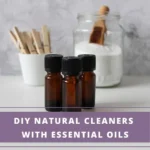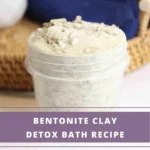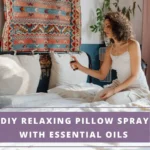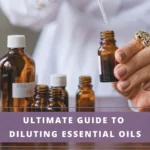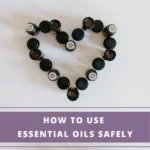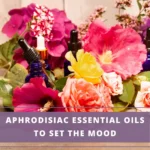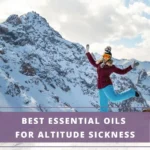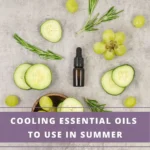As an Amazon Associate I earn from qualifying purchases. See Full Disclosure Here
Using relaxing essential oils is a popular, effective, and safe way to unwind and calm the mind and body at the end of the day.
In today’s fast-paced world, stress and anxiety have become all-pervasive in our lives. While there are various ways to cope with these conditions, one of the most effective natural remedies for stress is using aromatherapy for relaxation.
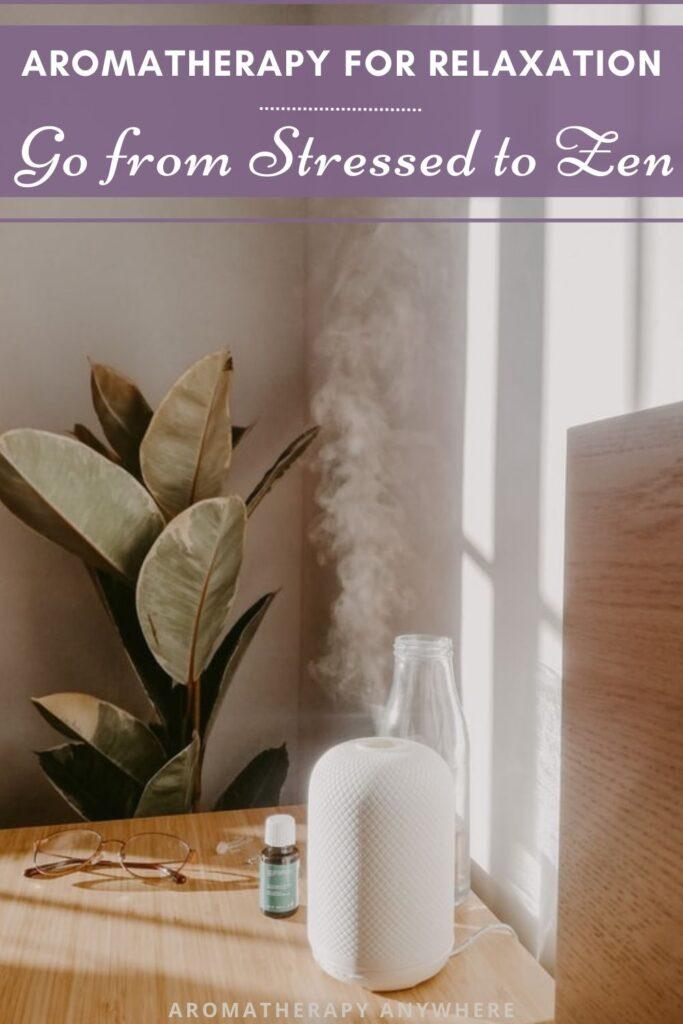 The Science Behind Using Essential Oils For Relaxation
The Science Behind Using Essential Oils For Relaxation
Essential oils are highly concentrated plant extracts that contain the natural fragrance and healing properties of the plant from which it has been obtained.
These oils have been used for centuries in various cultures for their therapeutic benefits, including relaxation, sleep, stress relief, and emotional support.
When inhaled, essential oils stimulate the olfactory system, which sends signals to the brain’s limbic system. This system regulates emotions, memories, and behaviors, making essential oils a powerful tool for improving mood and reducing stress levels.
The chemical composition of each essential oil determines its therapeutic properties. The best essential oils for relaxation contain a combination of ingredients that calm the nervous system in different ways.
For example, lavender oil contains linalool and linalyl acetate, which have sedative and calming effects on the nervous system.
Bergamot oil contains linalool and limonene, which have mood-enhancing and stress-reducing properties.
This is one of many studies that have shown that inhaling the aroma of relaxing essential oils can relieve anxiety and stress.
The same study lists Lavender, Roman Chamomile, Bergamot, Clary Sage, Sandalwood, Rose, and Orange as the most widely used anxiolytic oils. Anxiolytic refers to the ability to ease anxiety symptoms that may be caused by a reaction to stress.
The anxiolytic properties of these oils along with other calming effects make these the best essential oils for relaxation.
Whether you’re looking to alleviate stress, improve sleep quality, or simply unwind after a long day, aromatherapy for relaxation can help.
Here are the top 10 relaxing essential oils. Scroll further down for tips on how to use these essential oils for relaxation.
TOP 10 ESSENTIAL OILS FOR RELAXATION
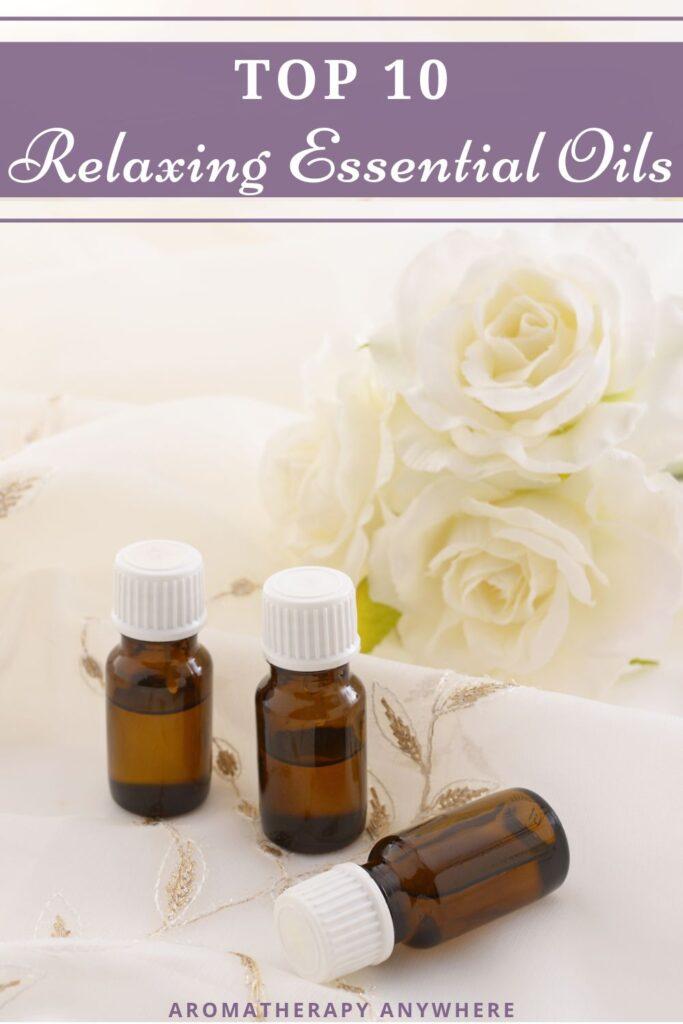 1. LAVENDER
1. LAVENDER
 Lavender is one of the most widely-used essential oils for relaxation. It has a calming scent that helps instill a sense of peace and relaxation, reduces anxiety, and improves sleep quality.
Lavender is one of the most widely-used essential oils for relaxation. It has a calming scent that helps instill a sense of peace and relaxation, reduces anxiety, and improves sleep quality.
Lavender essential oil is rich in linalool and linalyl acetate, which have proven sedative and calming effects on the nervous system.
Enter any spa and you’re almost certain to be greeted by the subtle, sweet, floral aroma of lavender. The goal is to help you relax as soon as you enter the facility.
This study done to determine the effects of aromatherapy in reducing job stress among nurses had some interesting results.
One group of nurses pinned a small bottle of lavender essential oil on their clothes. Another group had a placebo bottle pinned to their clothes. The nurses who inhaled the lavender aroma showed a much lower number of stress symptoms as compared to the nurses who didn’t, proving the efficacy of aromatherapy for relaxation.
Lavender is the best essential oil for relaxation, sleep, and stress relief.
2. Bergamot
 The fresh, citrusy scent of bergamot essential oil is both uplifting and calming. This anxiolytic essential oil is a natural mood booster that works wonderfully to ease feelings of anxiety and stress.
The fresh, citrusy scent of bergamot essential oil is both uplifting and calming. This anxiolytic essential oil is a natural mood booster that works wonderfully to ease feelings of anxiety and stress.
The main active ingredient in bergamot is linalyl acetate, which gives the oil its calming and mood-boosting effects.
This pilot study found that inhaling the aroma of bergamot essential oil boosts positive feelings and can be an effective treatment to boost mental health and well-being.
If you prefer citrusy scents over the floral aromas of lavender or ylang-ylang, consider using bergamot essential oil for relaxation.
Fun fact: Bergamot belongs to both, the citrus and floral aroma families. It has a predominantly citrusy aroma with mild floral notes.
As with all oils from the citrus aroma family, bergamot is photosensitive. Avoid exposure to the sun immediately after applying this oil topically.
3. CHAMOMILE
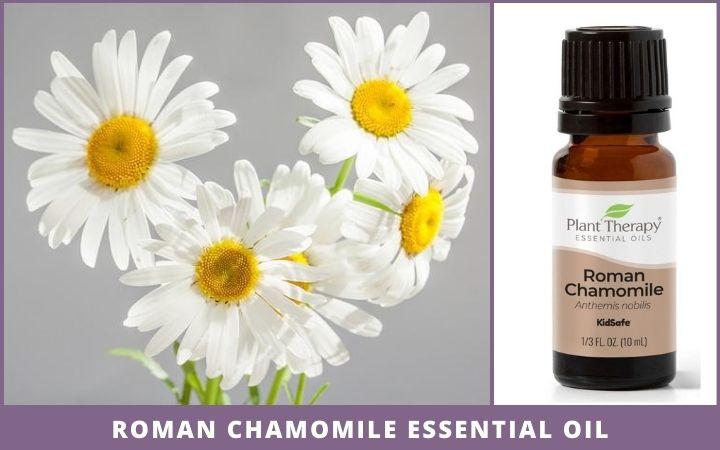 Roman chamomile’s anxiolytic properties stem from chamazulene, a substance that has been shown to have anti-anxiety and calming effects.
Roman chamomile’s anxiolytic properties stem from chamazulene, a substance that has been shown to have anti-anxiety and calming effects.
It is a mild relaxant and stress reliever that can be mixed with many other essential oils and can be used on children as well.
Roman chamomile essential oil has a mildly sweet and fruity scent that promotes relaxation, reduces feelings of anxiety, and improves the quality of sleep.
According to this controlled study, chamomile may have anxiolytic activity for individuals with Generalized Anxiety Disorder (GAD), without the side effects or dependence on conventional drug treatments.
Chamomile tea tops the list of herbal teas for relaxation. It’s a great alternative if you prefer herbal tea instead of using a relaxing essential oil. Read more about the benefits of chamomile tea.
4. Ylang Ylang
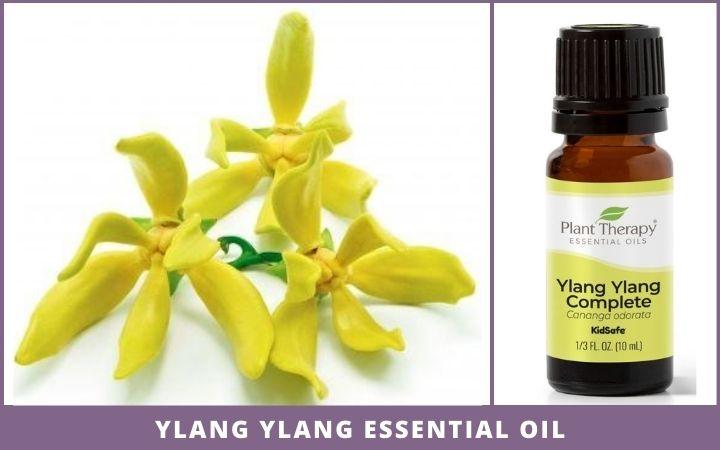 Ylang ylang essential oil has a strong, sweet, and distinctly floral scent that has a calming and soothing effect.
Ylang ylang essential oil has a strong, sweet, and distinctly floral scent that has a calming and soothing effect.
The oil contains linalool and geranyl acetate, both of which have calming and relaxing effects on the body.
Because of its distinctly feminine floral aroma, this relaxing essential oil does double duty as a perfume too. Dilute a drop or two in carrier oil and apply to your wrists or temples for a quick and easy way to relax on the go.
Ylang ylang is the best essential oil for when you want to unwind and relax but without the sedative effect.
5. Clary Sage
 Inhaling the woody herbal scent of clary sage reduces the stress hormone cortisol, which then induces a sense of calm and relaxation. The oil is rich in linalyl acetate, which reduces stress, improves mood, and promotes relaxation.
Inhaling the woody herbal scent of clary sage reduces the stress hormone cortisol, which then induces a sense of calm and relaxation. The oil is rich in linalyl acetate, which reduces stress, improves mood, and promotes relaxation.
Clary sage is the go-to relaxing essential oil if your stress and depression are caused due to hormonal changes brought about by menopause.
This study found that inhaling the aroma of clary sage brought about changes in the 5-hydroxytryptamine and cortisol levels in menopausal women.
Use clary sage essential oil for relaxation if your stress is menopause-related and if you’re looking for an aroma that’s neither floral nor citrusy.
6. Sandalwood
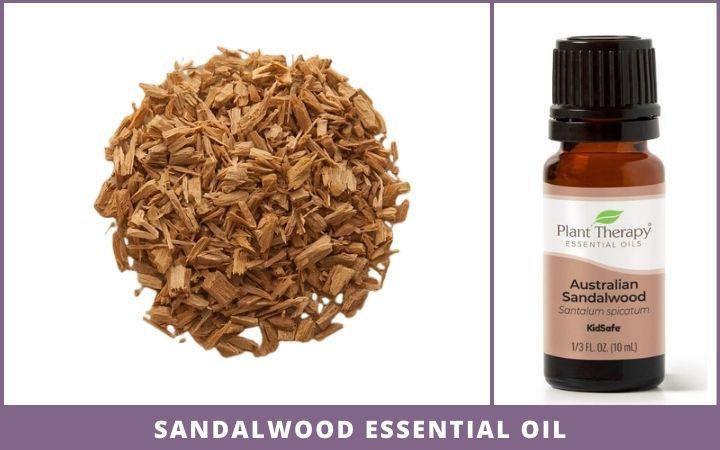 Sandalwood is one of the most valuable trees in the world. The wood of this tree is rich in santalol, which gives the oil its distinctive grounding and relaxing properties.
Sandalwood is one of the most valuable trees in the world. The wood of this tree is rich in santalol, which gives the oil its distinctive grounding and relaxing properties.
Results of a controlled pilot study showed that the earthy and warm aroma of sandalwood essential oil has anxiolytic properties. Although the sample size was not large enough to draw conclusive findings, the results strongly suggested that sandalwood is effective in reducing anxiety.
Inhaling the warm and woodsy scent of sandalwood essential oil promotes relaxation and reduces feelings of anxiety.
7. Rose
 Rose essential oil is another popular and widely used floral essential oil for relaxation. It is known for its sweet, floral aroma that can have a calming effect on the mind and body.
Rose essential oil is another popular and widely used floral essential oil for relaxation. It is known for its sweet, floral aroma that can have a calming effect on the mind and body.
Several studies have been done to study the relaxing effects of rose essential oil. In this study, participants in a group exposed to the aroma of rose rated themselves as calmer and more relaxed than participants in the control group.
Rose essential oil contains a complex mixture of compounds such as geraniol, nerol, and linalool, all of which contribute to its relaxing and anxiolytic properties.
Additionally, rose oil contains citronellol, which has been shown to have sedative effects in humans.
Special mention: If you like the floral aroma of roses, you may enjoy making your own rose-scented bath bombs or rose-infused oil. Both of these are easy DIY projects and using the products will also give the benefits of rose aromatherapy for relaxation.
8. Frankincense Oil
 The main active ingredient in frankincense oil is alpha-pinene, which gives the oil its calming and grounding effects.
The main active ingredient in frankincense oil is alpha-pinene, which gives the oil its calming and grounding effects.
It has a warm and woody scent that can help promote relaxation and reduce feelings of anxiety.
9. Vetiver
The deep, earthy scent of vetiver essential oil has proven grounding and calming effects.
Inhaling this aroma reduces feelings of anxiety and helps you feel calmer.
The main active ingredient in vetiver oil is vetiverol, which gives the oil its well-known grounding and calming properties.
10. Cedarwood
 Cedarwood essential oil has a warm, woody scent that is known for its calming and relaxing effects.
Cedarwood essential oil has a warm, woody scent that is known for its calming and relaxing effects.
The oil is rich in cedrol, which works to reduce feelings of stress and anxiety, increasing calm and relaxation.
It also has anti-inflammatory properties which help reduce muscle soreness and pain that prevent us from relaxing.
Relaxing Essential Oil Blends
Relaxing essential oils can be used individually or blended together to create unique and effective relaxation diffuser blends.
These relaxing essential oil blends combine two or more oils from different aroma families to create calming and soothing aromas.
You can make them yourself or buy premade synergy blends from various brands. You’ll find both options below.
Calming Blend
3 drops lavender oil
2 drops chamomile oil
2 drops bergamot oil
Grounding Blend
2 drops frankincense oil
2 drops patchouli oil
2 drops clary sage oil
Sleepy Time Blend
3 drops vetiver oil
2 drops lavender oil
1 drop ylang-ylang oil
These are the best premade relaxing oil blends:
Plant Therapy Relax Essential Oil Blend
Plant Therapy Pre-Diluted Relax Essential Oil Blend Roll-On
Starwest Botanicals Serenity Essential Oil Blend
Pure by Rachel Parker Relaxing Essential Oil Set
Plant Therapy Relaxation Set of 3 Blends
How TO USE RELAXING ESSENTIAL OILS TO RESTORE CALM AND BALANCE
 Relaxing essential oils and blends can be used in a variety of ways to reduce stress and promote calm and relaxation.
Relaxing essential oils and blends can be used in a variety of ways to reduce stress and promote calm and relaxation.
Use a Diffuser
Add a few drops of your chosen relaxing essential oil or blend to a diffuser and let the calming aromas swirl around you. Inhaling the relaxing scents will help you unwind and relax slowly.
Using an essential oil diffuser is the most convenient way to get the benefits of aromatherapy for relaxation throughout your home or office.
You can create a spa-like environment in a matter of just a few minutes by just adding a few drops of any relaxing essential in your favorite diffuser
Apply Topically
Topical application may be a more practical alternative for those times when you’re outdoors or there’s no electrical outlet nearby.
Simply apply diluted relaxing essential oils directly to the skin. This method is useful for targeting specific areas of the body, such as tense muscles or pressure points.
For general relaxing, apply the diluted oil to your wrists or temples and inhale the aroma.
Add to your Bath or Shower
Using relaxing essential oils in your bath is a winning combination. A warm bath is relaxing by itself. Inhaling the relaxing aromas as you sit in the warm bath takes the benefits of aromatherapy to the next level.
Don’t have the luxury of time? Use relaxing essential oils in the shower.
Use in DIY projects
If you make your own bath and body care products, candles, or room sprays, scent them with relaxing essential oils. You can do this easily by switching out the oils in the recipe with any of the relaxing essential oils or blends listed above.
Light an Aromatherapy Candle
Candles scented with relaxing essential oils are another great way to get the benefits of aromatherapy for relaxation.
My favorite is the Bath & Body Works Stress Relief Candle, which is scented with Eucalyptus and Spearmint essential oils. Read my review of this aromatherapy candle here or buy it directly from here
Get more ideas here: 25 Ways to Use Relaxing Essential Oils Without A Diffuser
Precautions and Safety Tips When Using Aromatherapy For Relaxation
While essential oils are generally safe when used correctly, there are some precautions and safety tips to keep in mind.
Always dilute essential oils before applying them to the skin.
Do not ingest essential oils unless under the guidance of a qualified aromatherapist.
Use only KidSafe essential oils for children.
Avoid using essential oils if you’re pregnant or breastfeeding.
Consult your healthcare provider before you start using aromatherapy for relaxation. This is especially important if you’re experiencing severe symptoms of stress.
Where to Buy High-Quality Relaxing Essential Oils
When purchasing essential oils, it is important to choose high-quality oils that are pure and free of synthetic additives. Look for oils that are labeled as 100% pure and have undergone third-party testing to ensure their quality.
Some reputable brands of essential oils include doTERRA, Young Living, and Plant Therapy. You can also find essential oils at health food stores, online retailers, and specialty shops.
Frequently Asked Questions About Essential Oils for Relaxation
How long do essential oils last?
The shelf life of essential oils varies depending on the oil and how it is stored. Generally, essential oils can last anywhere from 1-5 years or more if stored properly in a cool, dark place.
Essential oils offer a natural and effective way to promote relaxation and reduce stress and tension. By understanding the science behind essential oils and how to use them safely, you can experience the therapeutic benefits of these powerful plant extracts.
The top 10 relaxing essential oils include lavender, chamomile, bergamot, ylang-ylang, frankincense, patchouli, clary sage, vetiver, sandalwood, and rose. Experiment with different oils and blends to find the ones that work best for you.
Ready to start using essential oils for relaxation? Pick one or two from the list of relaxing essential oils and start using them today.
 Disclaimer: This information is not intended to serve as medical advice. Please consult your doctor before using any natural medication or if you experience any unusual symptoms. See Full Disclaimer here.
Disclaimer: This information is not intended to serve as medical advice. Please consult your doctor before using any natural medication or if you experience any unusual symptoms. See Full Disclaimer here.


